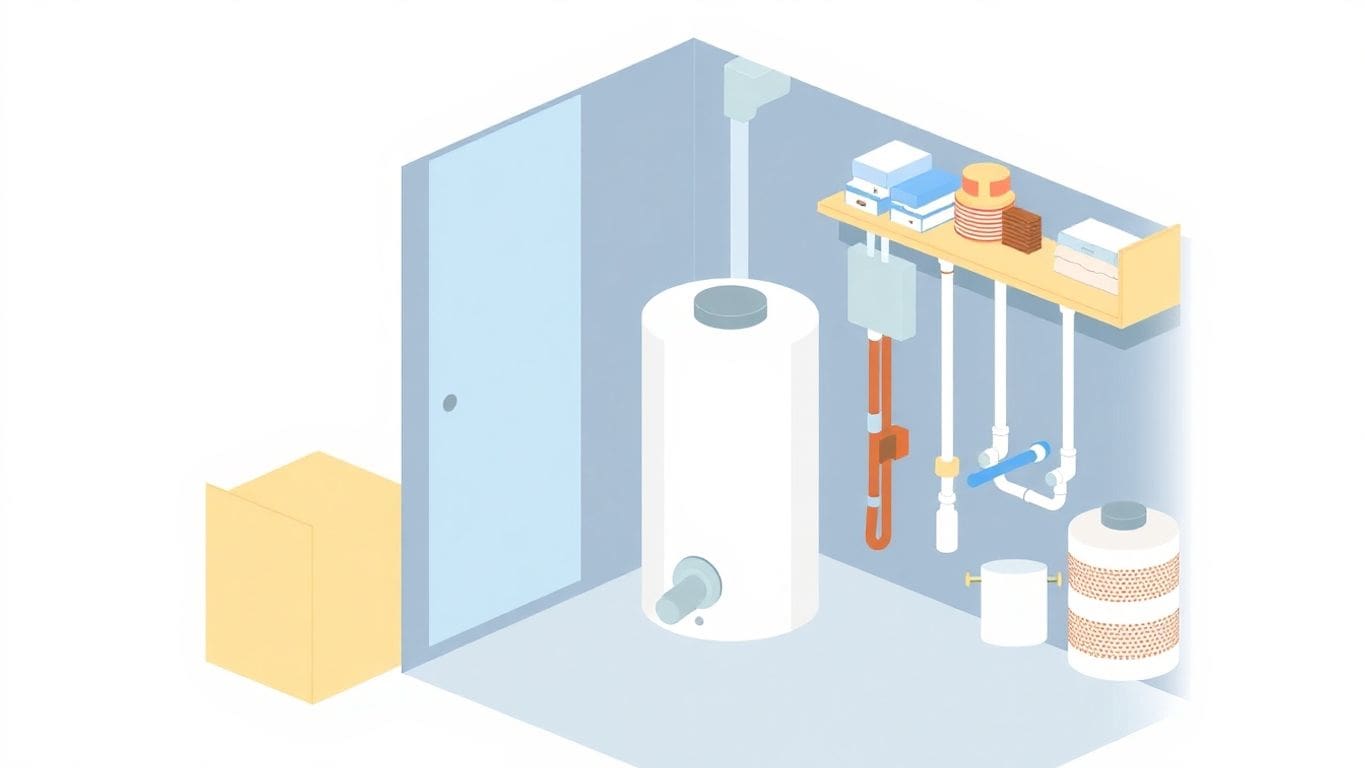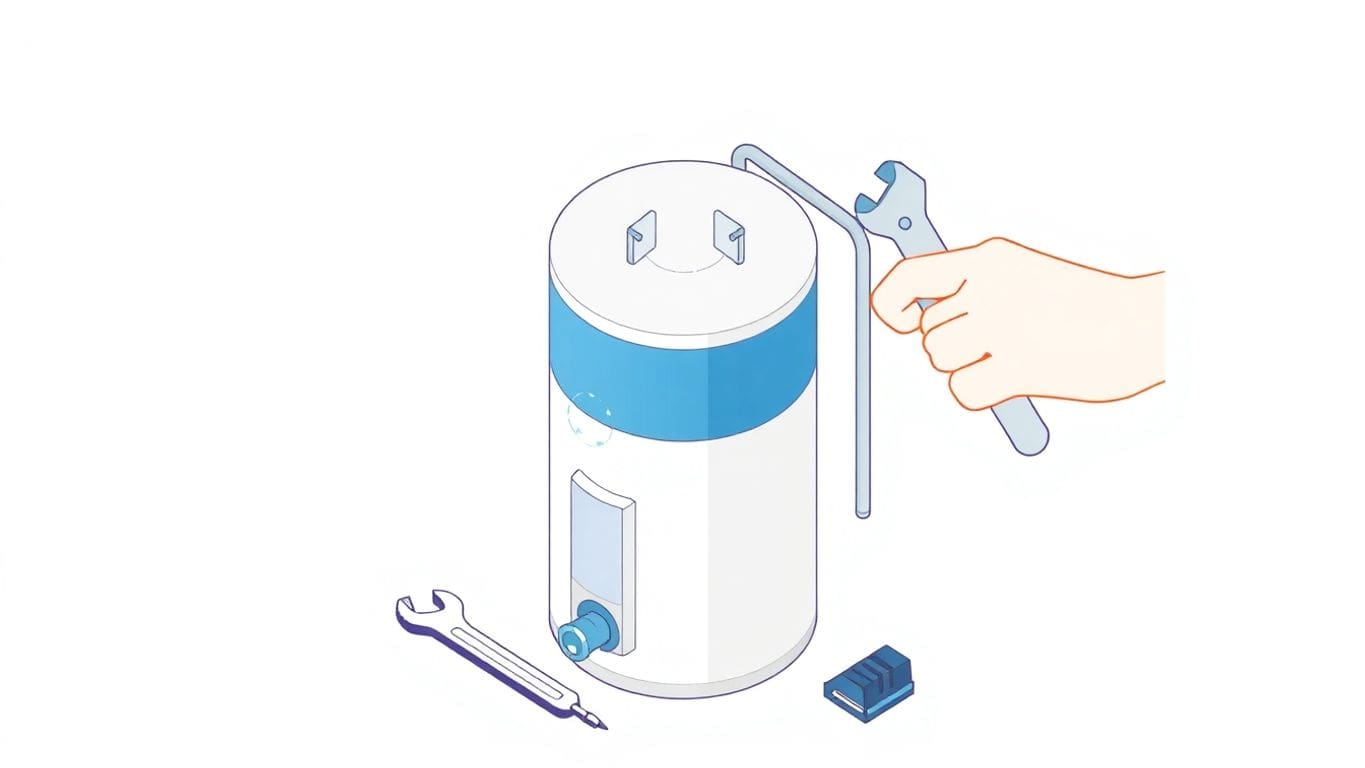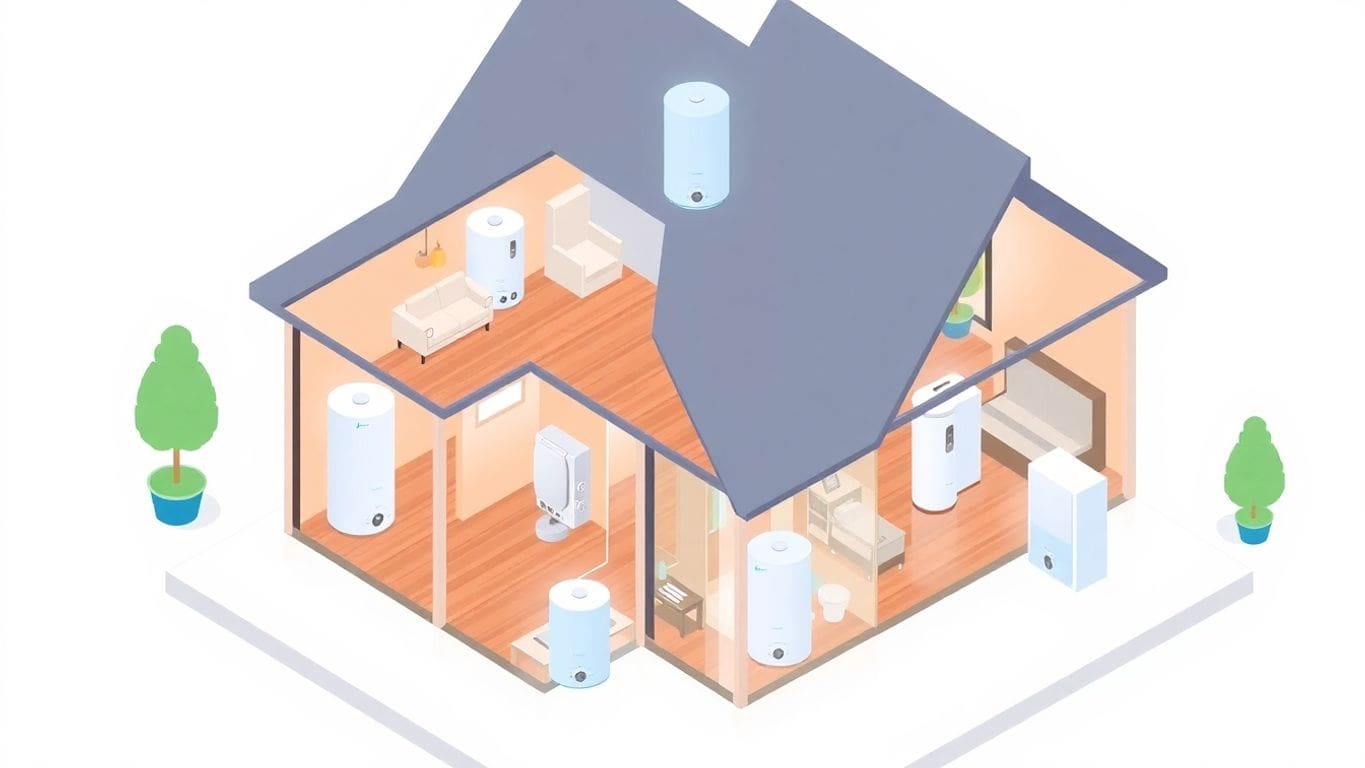
Looking to save on your energy bills while keeping your showers nice and warm? A heat pump hot water heater might just be the answer. These nifty devices use the heat from the air or ground to warm your water, making them super efficient. In this guide, we’ll explore the best heat pump hot water heaters for energy efficiency in 2025. From understanding how they work to comparing top brands, we’ve got you covered. Let’s dive in and find the right one for you.
Heat pump water heaters are pretty nifty. They work by moving heat rather than generating it directly. Imagine a fridge, but in reverse. Instead of cooling things down, it grabs heat from the air and uses it to warm up your water. Here’s the simple breakdown:
These heaters are all about saving energy and money. They use less electricity than traditional models, which means lower bills for you. Plus, they’re eco-friendly, reducing your carbon footprint. Here are some perks:
There are a few myths floating around about heat pump water heaters. Let’s clear them up:
Pro Tip: If your water heater is getting old, like around 15 years, it might be time to consider a replacement. New models are safer and more efficient, which means savings for you!
When you’re picking a heat pump water heater, energy efficiency is a big deal. These heaters are rated by something called the Uniform Energy Factor (UEF). The higher the UEF, the more efficient the heater is. Most heat pump water heaters are super efficient, often four times more so than regular electric heaters. This means they use less energy and save you money on your electric bill.
Many heat pump water heaters now come with smart home features. They can connect to your phone or smart home system. This lets you control the heater from anywhere. Some even have Demand Response, which helps manage your energy use by syncing with the local grid. This can be great for saving money and helping the environment.
Heat pump water heaters can be a bit noisy. It’s like having a refrigerator running in the background. When you’re thinking about where to install one, consider a spot that’s not near bedrooms or quiet spaces. Also, installing these heaters can be tricky, so it’s a good idea to hire a professional. Heating Geek offers expert advice on water heater installation and maintenance, making sure everything runs smoothly.
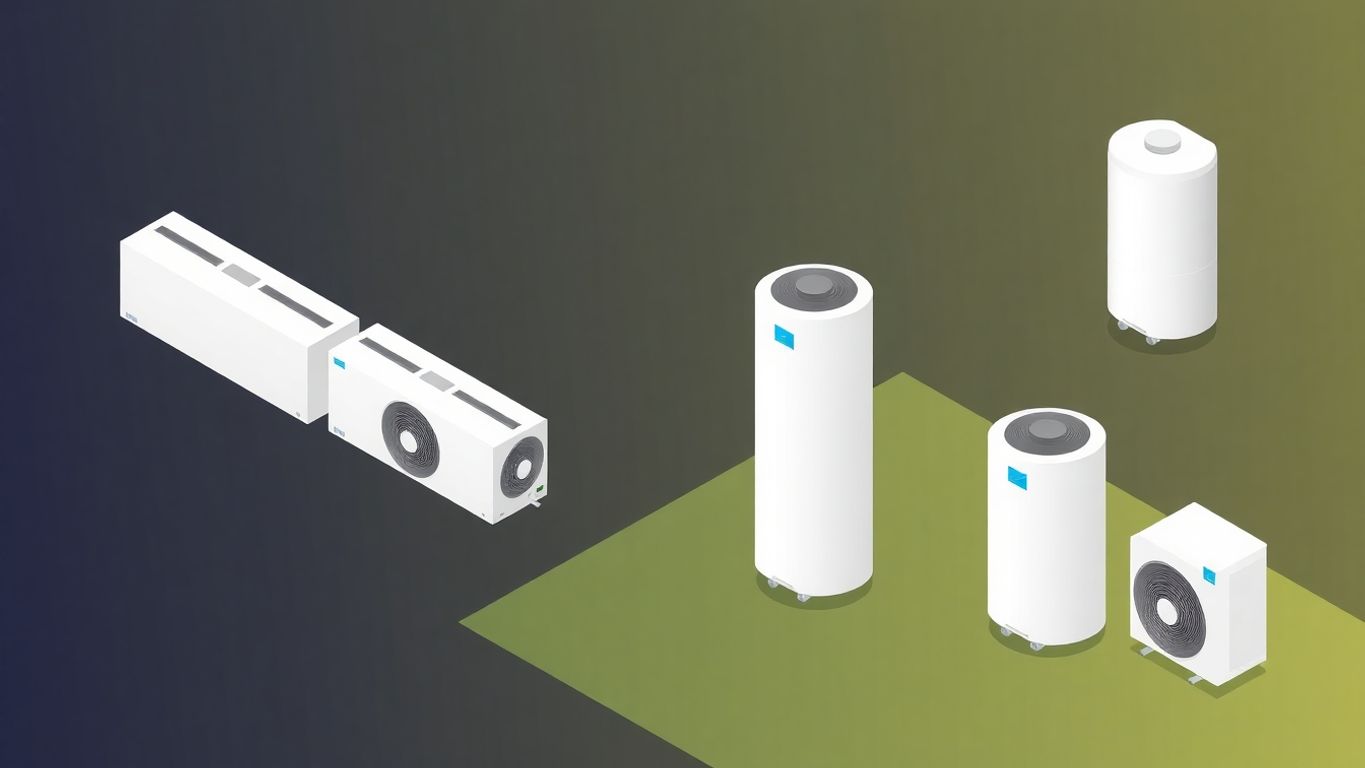
When looking at heat pump water heaters, Rheem and A. O. Smith are two big names you’ll come across. Rheem’s ProTerra series is known for its high efficiency and smart features. It has a hybrid backup system that helps when the hot water runs low. But, some folks say it takes a bit longer to heat up compared to others. On the other hand, A. O. Smith’s Signature 900 offers great efficiency without needing extra electrical work. It’s good for those who want to stick with their current setup.
Here’s a quick look at how they stack up:
| Feature | Rheem ProTerra | A. O. Smith Signature 900 |
|---|---|---|
| Efficiency | Very high | High |
| Smart Features | Yes | No |
| Electrical Needs | Might need upgrades | No upgrades needed |
| Backup System | Hybrid | None |
Midea is another brand that’s making waves. Their heat pump water heaters are praised for being compact and easy to fit in small spaces. They also have a good balance between price and performance. If you’re looking for something that’s efficient and doesn’t take up much room, Midea could be a good choice.
When picking a water heater, listening to what other people say can be super helpful. Many customers love Rheem for its energy savings and smart tech. But, some mention the wait for hot water can be annoying. A. O. Smith users often highlight how easy it is to install and use. Midea gets points for being affordable and space-saving, though some wish it had more advanced features.
Choosing the right brand depends on your needs. If you want smart tech, Rheem might be the way to go. For easy installation, A. O. Smith is a solid pick. And if space is tight, consider Midea. Think about what matters most to you before making a choice.
When it comes to setting up a heat pump water heater, picking the right installer is super important. You want someone who knows their stuff. Look for installers with experience in heat pump systems. Ask if they have any certifications. It’s a good idea to read reviews from other customers too.
Keeping your heat pump water heater in top shape means doing regular maintenance. Check the air filters every few months and clean them if needed. This helps the system run smoothly. Also, inspect for any leaks or strange noises. If you spot something odd, call a professional.
Sometimes, things can go wrong with your heat pump water heater. If the water isn’t hot enough, first check the thermostat settings. Make sure they’re set correctly. If there’s a noise issue, it might be the fan. Fans can make noise, but if it’s too loud, there could be a problem. Always consult the manual for guidance or call an expert if you’re stuck.
Regular checks and timely fixes can keep your heat pump water heater running efficiently. Don’t wait for a problem to get worse; a little attention now can save you a lot of trouble later.
If you live in a place with cold winters, you should know that heat pump water heaters might not work as well when it’s really chilly. They pull heat from the air, which means they have less heat to work with in the cold. In super cold places, you might need a backup system or consider a ground-source heat pump, which uses the earth’s heat instead.
In humid areas, heat pumps can actually be a bonus. They act a bit like a dehumidifier, pulling moisture from the air as they work. This can help keep your home less damp. But remember, the extra water they collect has to go somewhere, so you might need to set up a drain.
Heat pump water heaters are efficient, but their performance can change with the seasons. They work best in mild to warm weather when there’s more heat in the air. In winter, they might need to run longer to heat water, which could mean higher energy use. It’s good to keep this in mind when looking at your energy bills throughout the year.
Choosing the right heat pump for your climate is key. It can save you money and keep your home comfortable all year round. Always think about the weather where you live before deciding on a system.
When you first look at the price tag of a heat pump water heater, it might seem a bit steep. They’re usually more expensive than standard electric or gas heaters. Expect to pay around $1,000 to $1,500 more upfront. But don’t let that scare you off! Over time, you’ll likely save money because these heaters are super efficient. They use less energy, which means you’ll see a drop in your monthly utility bills.
Here’s a simple comparison:
| Type of Heater | Typical Cost |
|---|---|
| Standard Electric/Gas | $700 – $1,000 |
| Heat Pump Water Heater | $1,700 – $2,500 |
Good news! You can get some of your money back through tax credits and rebates. Thanks to the Inflation Reduction Act, you might qualify for a federal tax credit of up to $2,000. Some states even offer extra rebates. So, while the initial cost is higher, these incentives can help make a heat pump water heater more affordable.
Heat pump water heaters are champs when it comes to energy use. They work by moving heat, not creating it, making them about three to five times more efficient than regular heaters. This means they can save you a lot on energy bills. If you switch from an electric heater, your energy use could drop by about 75%. If you’re moving from gas, the savings might be less dramatic, but still significant.
Consider upgrading if your current heater is old. Signs of a failing unit include strange noises and rusty water. Upgrading can save you money in the long run and improve performance.
So, while a heat pump water heater might cost more at the start, the savings on your bills, combined with tax credits, make it a smart choice for many homes. Plus, you’ll be doing your part for the planet by using less energy!
Using a heat pump water heater is a smart way to cut down on carbon emissions. These heaters use the heat from the air around them instead of burning gas or using lots of electricity. This means they release less carbon dioxide into the air. It’s like giving the planet a little breather.
Heat pump water heaters are great for the environment because they use renewable energy. This means they pull heat from the air, which is a resource that won’t run out. Plus, they can help you save energy, which is good for the earth and your wallet.
Most heat pump water heaters use eco-friendly refrigerants. These are special chemicals that help move heat without harming the ozone layer. This makes heat pumps a safer choice for the planet compared to older systems that use harmful chemicals.
Choosing a heat pump water heater is not just about saving money. It’s about doing your part to help the environment. Every small change adds up to make a big difference.
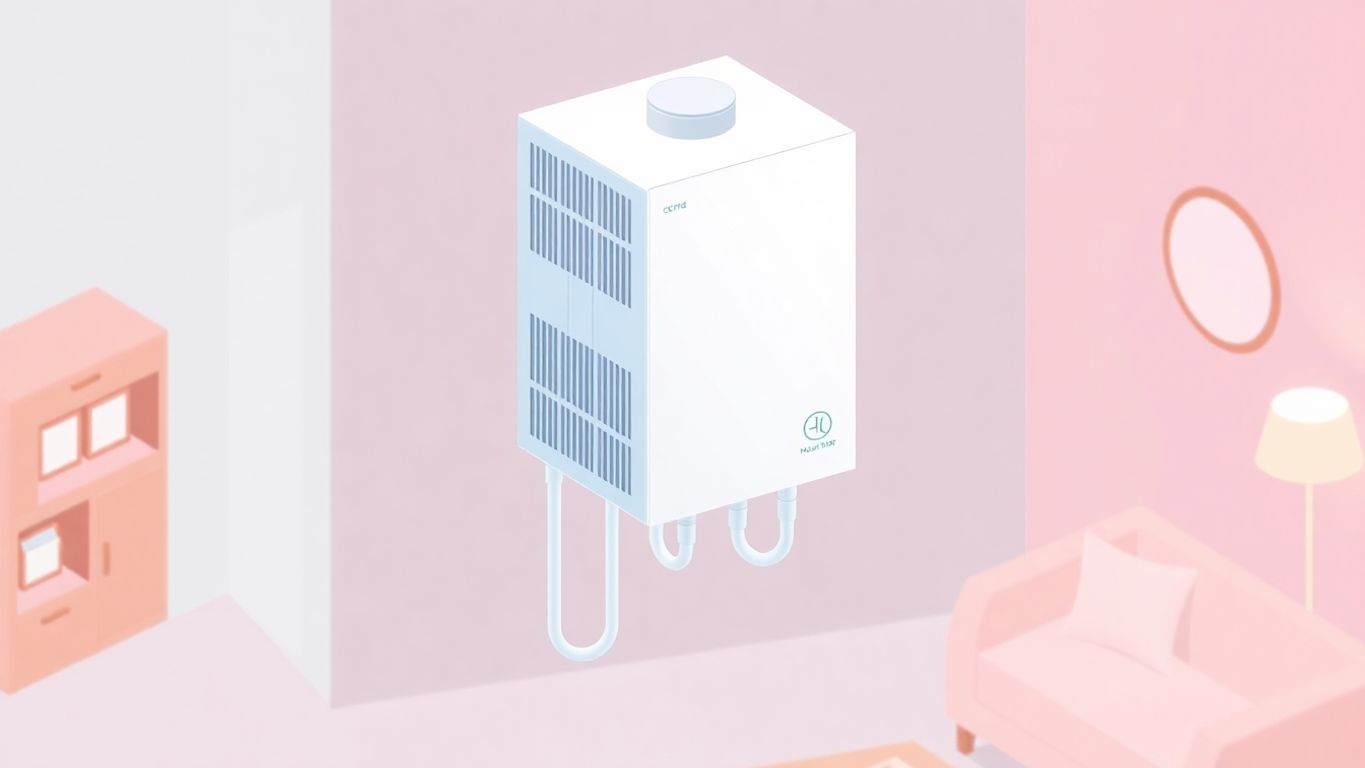
Picking the right size water heater is super important. You want enough hot water for everyone, but not too much that it wastes energy. Consider how many people live in your house. Think about your daily hot water habits. Do you take long showers or have a big family? These things matter.
Here’s a simple way to figure it out:
Remember, if you often run out of hot water, your current heater might be too small. Choosing the right size water heater is crucial for meeting household hot water needs.
Bigger isn’t always better. A huge water heater can waste energy and money. Oversized units heat more water than you need. This can lead to higher bills. Plus, they take up more space in your home.
Your family size directly affects the type of water heater you need. Small families might get by with a smaller unit. Bigger families or those planning to grow should think about larger options. If you add more people to your household, you might need to upgrade.
Tip: If your family grows or you notice issues, like running out of hot water quickly, consider upsizing your heater. It’s important to call a professional for troubleshooting when problems persist or if safety concerns arise, such as gas smells or water leaks, to prevent further damage.
Choosing the right water heater can make your home more comfortable and save you money. Keep these tips in mind when shopping for your next heater!
Heat pump water heaters are evolving quickly. New technologies promise to make them even more efficient. For example, some models now come with smart controls. These let you manage your heater from your phone. Imagine adjusting the temperature while you’re on vacation! Plus, the integration with home energy systems is getting better. This means your water heater could work with solar panels or other renewable energy sources.
The market for heat pump water heaters is set to grow. More people are looking for ways to save on energy bills. And governments are offering incentives to switch to these eco-friendly devices. Here’s a simple breakdown:
Technology is making heat pump water heaters better. They use less energy than traditional heaters. Efficiency is the key here. Some models can cut energy use by up to 75%. Plus, they help reduce your carbon footprint. This is good for the planet and your wallet.
As we move forward, heat pump water heaters offer a promising solution for both energy savings and environmental protection. They’re not just a trend; they’re the future of home heating.
Heat pump water heaters move heat from the air into the water, instead of creating heat directly, making them more efficient.
These heaters save energy, reduce electricity bills, and are environmentally friendly by using less energy compared to traditional heaters.
They can be slightly noisier than traditional heaters, but the noise level is similar to a refrigerator and usually not bothersome.
Yes, but their efficiency might decrease in very cold climates. Some models are designed to work better in such conditions.
They require regular maintenance like checking filters and ensuring proper airflow, but they are generally low maintenance.
The initial cost can be higher than traditional heaters, but the long-term savings on energy bills can offset this expense.
They typically last about 10-15 years with proper maintenance, similar to traditional water heaters.
Yes, many areas offer tax credits or rebates for installing energy-efficient appliances like heat pump water heaters.

